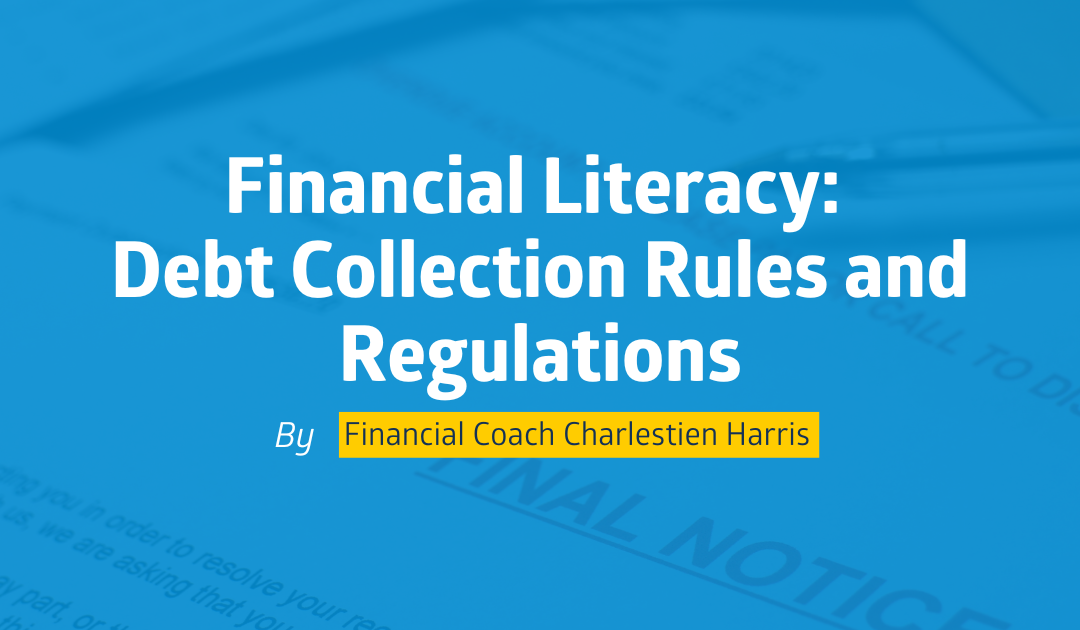By Charlestien Harris
I am still trying to get as much factual information as I can to consumers, because what you don’t know can harm you – despite the old adage that says, “What you don’t know won’t hurt you.” Not knowing critical information can possibly do great harm to you when you are trying to complete financial transactions and you don’t have all the information you need to make a critical decision.
Debt collection is one of the areas where not knowing your rights as a consumer can be harmful to you in so many ways. The debt collection sector is a multi-billion-dollar industry that affects at least 70 million consumers who have, or are contacted about collecting, unpaid debts.
Many of you may not know that the Fair Debt Collection Practices Act (FDCPA), which became effective in March 1978, was designed to eliminate abusive, deceptive, and unfair debt collection practices. This law applies only to the collection of debt incurred by a consumer primarily for personal, family, or household purposes. It does not apply to the collection of corporate debt or debt owed for business or agricultural purposes. The FDCPA defines a debt collector as any person who regularly collects, or attempts to collect, consumer debts for another person or institution or uses some name other than its own when collecting its own consumer debts.
Let’s look at some of the regulations established within the debt collection industry.
- It established communication guidelines with the consumer.
This is very important to know. A debt collector may not:
• communicate with a consumer at any unusual time (generally before 8 a.m. or after 9 p.m. in the consumer’s time zone) or at any place that is inconvenient to the consumer, unless the consumer or a court of competent jurisdiction has given permission for such contacts.
• contact the consumer at their place of employment if the collector has reason to believe the employer prohibits such communications.
• contact the consumer directly if the debt collector knows the consumer has retained an attorney to handle the debt and can easily ascertain the attorney’s name and address; all contacts must be with that attorney, unless the attorney is unresponsive or agrees to allow direct communication with the consumer.
• communicate with a consumer when they refuse, in writing, to pay a debt or requests that the debt collector cease further communication; the collector must cease all further communication, except to advise the consumer that this request will stop all communication from the debt collector.
This can mean that if they decide to take you to court, you may not receive a notice unless you get a summons, so that cease-and-desist request may need some thought before you enact it. - A debt collection agency cannot harass or make threats.
A debt collector, in collecting a debt, may not:
• harass, oppress, or abuse any person.
• use or threaten to use violence or other criminal means to harm the physical person, reputation, or property of any person.
• use obscene, profane, or other language that abuses the hearer or reader of a notice or advertise a debt for sale to coerce payment.
• annoy, abuse, or harass persons by repeatedly calling their telephone number or allowing their telephone to ring continually.
• make telephone calls without properly identifying themselves, except as allowed to obtain location information. - You have the right to have the debt in question validated.
A debt collector must provide the consumer with certain basic information. If that information was not in the initial communication and if the consumer has not paid the debt five days after the initial communication, all the following information must be sent to the consumer in written form:
• The amount of the debt.
• The name of the creditor to whom the debt is owed.
• Notice that the consumer has 30 days to dispute the debt before it is assumed to be valid.
• Notice that upon such written dispute, the debt collector will send the consumer a verification of the debt or a copy of any judgment.
• If the original creditor is different from the current creditor, a notice that if the consumer makes a written request for the name and address of the original creditor within the 30-day period, the debt collector will provide that information.
If, within the 30-day period, the consumer disputes in writing any portion of the debt or requests the name and address of the original creditor, the collector must stop all collection efforts until he or she mails the consumer a copy of a judgment or verification of the debt, or the name and address of the original creditor, as applicable.
I know this is a lot of information, but this is just a portion of what the Fair Debt Collection Practices Act (FDCPA) covers when it comes to the rights consumers have under the law. You can get additional information from a financial counselor.
Southern Bancorp has financial counselors available at certain locations, who you may also reach by phone or web if there is not one available near you. Give your local branch a call to find out how to contact one of our counselors.
For more information on this and other financial topics, visit www.banksouthern.com/blog, email me at Charlestien.Harris@testbanksouthern.aceone.io, or call me at 662-624-5776.
Until next week – stay financially fit!

